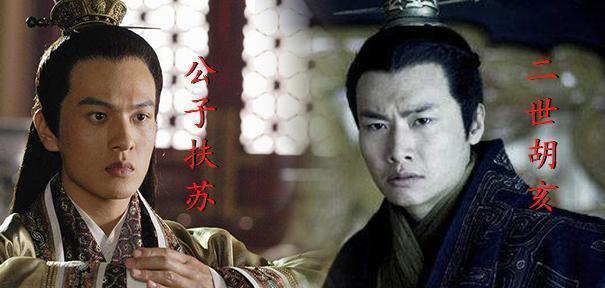Hu Hai of Qin II was not surnamed Hu, nor was fu su, the eldest son of Qin, and their two brothers were surnamed Yin. Hu Hai and Fu Su are just names, not surnames or surnames. In the pre-Qin era, surnames were separated, surnames were not married, surnames were not noble, women used surnames, and men used surnames. Because Hu Hai and Fu Su are both men, they do not use the surname of Ying, and they do not have a fiefdom, so they have no surname; some surnames are not available, and there is no family name, so they can only be called by name.

The surname originated in the matriarchal society period, and people of the same tribe could not intermarry, so the larger tribes all had surnames. The surname is related to the female word, which also shows that the original role of the surname was to distinguish between blood relations. The eight ancient surnames of the ancients: Ji, Jiang, 姒, 嬴, 妘, 妫, 姚, 妊, are all female characters. The ancestor of the Qin people, Boyi, helped Dayu to control the water, and Emperor Shun gave Boyi the surname of Yi, so the Qin people took Ying as their surname.
The pre-Qin nobles all had fiefs, and the descendants of the nobles basically took the fiefs as their clans. For example, the ancestor of the Zhao Kingdom was originally a member of the Ying people, and because of his merits to King Mu of Zhou, he was sealed in Zhao City, so the ancestors of the Zhao dynasty took Zhao as their clan. The father-made surname is Yin, the clan Zhao, and the name is The Father-Maker. If the sons of the Duke of Zhao are re-enthroned, they will also take the feudal city as their clan, for example, Zhao Hao was named Ma Fujun because of his anti-Qin merits, and his descendants took Ma as their clan.
The ancestor of Tian Qiguo, Chen Guan, was a prince of Chen Guo, surnamed Concubine(妫), and was of the Chen clan. Chen Quan's arrival in the State of Jiang Qi was heavily used by the Duke of Qi Huan, because the ancient Chinese "Chen" and "Tian" were homophonous, so Chen Quan's line was Tian in the Jiang Qi state clan. After the establishment of the State of Tian Qi, the royal family was the Tian clan, such as the famous King of Qiwei, whose real name was Tian Yinqi. After the State of Tian Qi was attacked by the State of Qin, the sons of the Qi royal family took Wang as their clan, meaning the descendants of the royal family. The emperor of the new dynasty, Wang Mang, traced his roots and searched for his ancestors, and his ancestor was the royal family of the State of Tian Qi.
At the time of the Qin and Han Dynasties, it was the time when surnames were unified, and the role of surnames and surnames only represented family inheritance, and no longer had the function of distinguishing between nobles and lowly. Although the two royal families of Qin and Zhao are of the same clan, for hundreds of years, the blood kinship has been weakened, and the hatred of the national enemy has become a feud, so the Qin royal family takes Ying as the surname, and the Zhao royal family takes Zhao as the surname. Qin Shi Huang's full name was Zhao Zheng during the Zhao Kingdom, and after returning to Qin, he corrected his name to Yingzheng. In this sense, HuHai and Fusu should be called Yinhuhai and Yinfusu respectively according to the titles of modern people.
After the establishment of the Qin Dynasty, many people still hoped to partially restore the sub-feudal system and restore the differential treatment of surname and surname. Therefore, Hu Hai did not have a surname, if Hu Hai was divided into Yan kingdoms as monarchs, then Hu Hai was surnamed Yan; if Hu Hai was divided into Chu states as monarchs, then Hu Hai was surnamed Chu. After the fall of Qin, The Han Dynasty inherited the Qin system, and Liu Bang's sons were divided into kings, but their surnames were all Liu, which shows that the surnames had been unified during the Han Dynasty.
Fu Su's name is taken from the Book of Poetry. Guofeng Zhengfeng Shanyou Fusu represents The high hopes of Yingzheng for this son. Hu Hai's name was taken casually, and his mother was Hu Ren, born in the Year of the Pig, so he was named Hu Hai. The State of Qin began with the Duke of Qin, and all the monarchs of the past were not Emperors of Xia, of which the majority of them were Ming Jun, and only Hu Hai was Emperor Xia. Therefore, although Hu Hai was noble as emperor, he insulted his ancestors with the surname of Ying, and his surname of Yin was deprived of the power and only called him by his first name.
In addition, there are many sources of the Hu surname, and the longest one originates from Emperor Shun. In the early years of the Western Zhou Dynasty, Emperor Shun's descendant Hu Gongman was enfeoffed with the State of Chen, and at the end of the Spring and Autumn Period, the State of Chen was destroyed by the State of Chu, and some of his descendants took Hu as their clan.